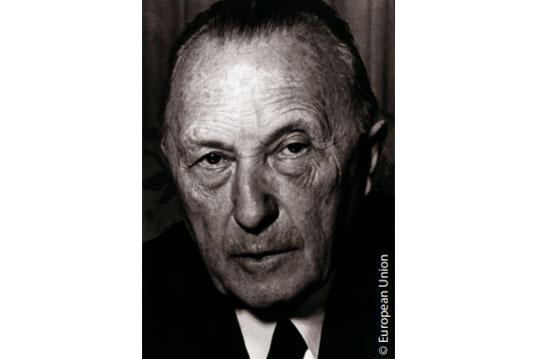
As the first Chancellor of the newly-formed Federal Republic of Germany from 1949-63, Konrad Adenauer changed the face of post-war German and European history more than any other individual. Like many politicians of his generation, Adenauer had already realised, following the First World War, that lasting peace could only be achieved through a united Europe.
In past decades and centuries, coal and steel have played a destructive role in conflicts between the peoples of Europe, having been used to manufacture weapons. Let us hope coal and steel will now unite them in thinking and acting together.
Life and times
Born in Cologne on 5 January 1876, Adenauer’s marriage into an influential Cologne family led him to become active in politics. Taking full advantage of his political talent, as a member of the Catholic ‘Zentrum’ party his career took flight and he became Mayor of Cologne in 1917.
From the late 1920s, the National Socialist (Nazi) Party began a slander campaign against Adenauer. In 1933, after the Nazis had taken power, Adenauer refused to decorate the city with swastikas for a visit by Hitler. He was then dismissed from office and his bank accounts frozen. After the failed attempt on Hitler’s life in 1944, Adenauer was imprisoned in Cologne‘s notorious Gestapo prison, Brauweiler.
After the war, he devoted himself to establishing the Christian Democratic Union (CDU) which he hoped would unite Protestant and Catholic Germans into one party. In 1949, he became the first Chancellor of the Federal Republic of Germany (West Germany).
A vision for Europe
Adenauer’s experiences during the Second World War made him a political realist and he focused his attention on promoting the idea of pan-European cooperation. Adenauer was a great proponent of the European Coal and Steel Community, which was launched with the Schuman Declaration on 9 May 1950, and the Treaty for the European Economic Community, signed in March 1957.
Konrad Adenauer, speaking in Metz, 1966
Konrad Adenauer, speaking on 2 July 1966 in Metz
If we succeed in creating an organisation that allows the French to see everything that goes on in steel manufacturing and coal mining in Germany – and if, in turn, the Germans can see what's happening in these fields in France – then this system of mutual control is the ideal way to pursue a policy based on trust.
Publications
More about Konrad Adenauer’s life, work and contribution to the European project
